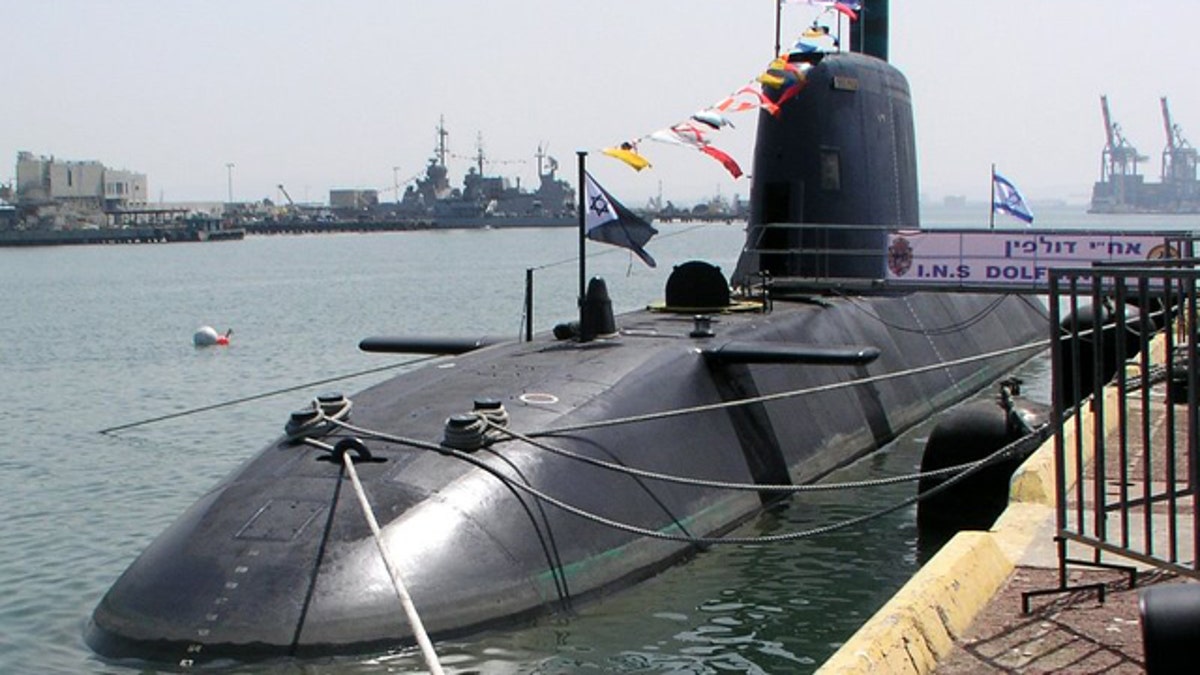
An Israeli Dolphin-class submarine, long assumed to be assumptions "second strike" nuclear missile platforms. (Wikipedia)
JERUSALEM – An apparently innocuous note from an official history of Israeli submarines has offered a glimpse into the murky depths of the country's nuclear secrecy.
Contributing a preface and summation chapter for the recently published "Israeli Vessels in the Fourth Dimension," former admiral Shaul Chorev writes that the five major powers -- the United States, Russia, China, France and Britain -- have deployed submarines with nuclear-tipped ballistic missiles.
With India planning to match them by decade's end, Chorev writes, it would be "the sixth country in the world to have a sea-based strategic deterrence capability" -- implying, by default, that Israel's submarines carry conventional arms only.
That seems hard to reconcile with analysts' assumptions that Israel's three, diesel-fueled Dolphin submarines are "second strike" nuclear missile platforms, deterring any catastrophic attack on the Jewish state by promising retaliation in kind. Though the publishers said the book underwent vetting by military censors, Chorev's statement also appears to clash with the "ambiguity" policy under which Israel neither confirms nor denies having -- or lacking -- nuclear bombs in any form.
As current director of the Israel Atomic Energy Commission, Chorev helps fine-tune this four-decade-old official reticence, making it unlikely that he would commit a faux pas in print. Asked about the book passage, a commission spokeswoman had no immediate comment. But a former Israeli official who had been in charge of safeguarding state secrets played down its impact.
"He was writing about foreign navies, so this should not be too much of a concern," the ex-official said, also acknowledging that censors were generally more vigilant for disclosures about existing Israeli warheads and delivery systems.
Much hangs on what Chorev means by "capability."
Another former official who spoke on condition of anonymity said Chorev may have been hinting that, while the Dolphins are able to fire nuclear missiles, they are not routinely deployed with them aboard. Unlike nuclear-powered submarines, the Dolphins must be regularly refueled and serviced in port.
PARSING STRATEGY
"Israel would only need a 'second strike' option when there is the threat of it coming under a 'first strike,' and none of its enemies has the bomb yet. That obviously affects operational planning," the former official said.
Stephen Saunders, editor of Jane's Fighting Ships Yearbook, said it looked like Chorev was drawing a distinction between major powers' nuclear submarines, which are big enough to carry long-range "strategic" missiles, and the Dolphin, whose 10 torpedo tubes accommodate much less powerful cruise missiles.
"Therefore, with a nuclear warhead, a cruise missile ... could be described as a sub-strategic weapon. Whether or not the Israelis have such a weapon is open to question," Saunders said.
"I can only suggest that the relatively short range and vulnerability of sub-sonic cruise missiles makes them less credible as a deterrent."
Independent analysts estimate that the Jewish state has anywhere from 80 to 200 nuclear weapons.
Israel has two more diesel-fuelled Dolphin submarines on order from Howaldtswerke-Deutsche Werft, a German firm building them at a steep discount as part of Berlin's commitment to shoring up a Jewish state founded in the wake of the Holocaust.
Negotiations on buying a sixth Dolphin foundered in July after Germany declined to underwrite the purchase again.
German opposition parties have voiced misgivings about providing Israel with another potential nuclear weapons platform. The Israelis may therefore have a vested interest in lowering the strategic import of the submarines.
Still, the menace associated with the Dolphins helps keep world powers focused on pursuing a diplomatic solution to the deadlock around the nuclear plans of Israel's arch-foe, Iran.
For the first time, an Israeli submarine last year sailed the Suez Canal, a potential short-cut to the Iranian coast.
